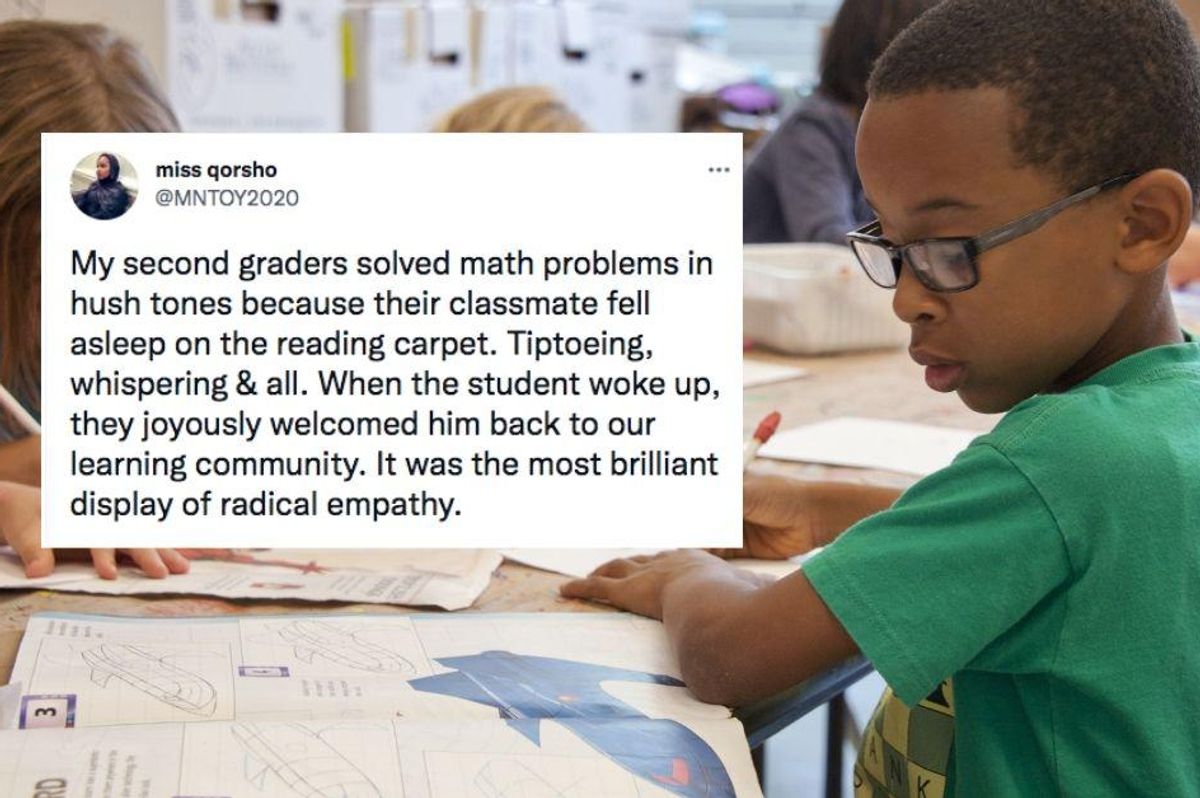
There’s an odd tendency for some people to try to scare children into believing that the world is a cold, cruel, unforgiving and unsympathetic place. The intention may be to prepare them for “the real world,” but we don’t do kids any favors by teaching them that no one cares about their needs.
In the actual real world, most people are decent, kind and helpful. Sure, there are some jerks and some hard-nosed authoritarians who seem to revel in making people’s lives hell, but by no means should they be considered the norm. We mold the culture we live in by the choices we make in how we interact with people, and we mold it even more by how we teach our children. If we harden them with unwaveringly harsh policies, we create a harder, harsher world. If we expect and allow them to be respectful of one another’s needs and differences, we create a kinder, more supportive world.
Qorsho Hassan, who was Minnesota’s Teacher of the Year for 2020-2021, shared a wonderful example of empathetic teaching on Twitter. She wrote:
“My second graders solved math problems in hush tones because their classmate fell asleep on the reading carpet. Tiptoeing, whispering & all. When the student woke up, they joyously welcomed him back to our learning community. It was the most brilliant display of radical empathy.”
My second graders solved math problems in hush tones because their classmate fell asleep on the reading carpet. Tip… https://t.co/ZJ4c0qSHyQ
— miss qorsho (@MNTOY2020)
1635387833.0
Beautiful. Every part of this tweet is beautiful, from the visual of the students trying to let the student sleep to her referring to the class as “our learning community.”
We shared a story of a teacher explaining why he let his student sleep in class a few years ago, and the response was overwhelmingly positive. That alone should tell us what kind of world we actually live in. Radical empathy may not be as rare as some seem to think it is.
Hassan’s tweet prompted others to share similar stories, each as heartwarming as the next.
@MNTOY2020 I had a senior once fall deeply deeply asleep in class. He had been training for the state wrestling tou… https://t.co/d63oAnVLI5
— Ms. AK (@akincali)
1635457576.0
“I had a senior once fall deeply deeply asleep in class,” wrote another teacher. “He had been training for the state wrestling tourney and was exhausted. I let him sleep, the kids tiptoed out after class, and I let him sleep through most of lunch.”
People often underestimate how much kids in school are juggling on top of just the basic upheaval of growing. And that’s assuming everything is healthy at home. For kids coming from homes with neglect or abuse, poverty or food insecurity, illness or tragedy, some extra care is not only nice, but necessary.
@cswignes Exactly! All behavior is communication. 🙌🏽
— miss qorsho (@MNTOY2020)
1635514580.0
As another teacher pointed out, there are legitimate reasons for a child to be so tired that they fall asleep in class. Most kids wouldn’t nap if you tried to make them, so there must be a lot going on for a kid to drift off at school. It’s entirely possible that they just kept themselves up too late watching TikTok videos or something, but we also create a more compassionate world by giving people the benefit of the doubt and watching for patterns that might clue us into some larger issue.
@MNTOY2020 Kids can sometimes be so magnanimous & they will judge their teacher by how compassionate they are with… https://t.co/do9QB5dCzz
— Mary Najeddine (@MNajeddine)
1635476069.0
Kids learn as much by example as they do by what we actively try to teach them, and clearly Hassan is exemplifying a culture of kindness and compassion in her classroom.
So many lessons go beyond academics, and often those lessons are the most important for kids to learn. We can watch out for one another. We can honor our different circumstances. We can make allowances, especially when they aren’t hindering anyone else’s progress. We can treat everyone as if their needs matter and celebrate people getting what they need to be successful.
We have to live the way we want the world to be, and radical empathy like this creates a better world for everyone.
Thank you Qorsho Hassan for showing us a simple yet profound example of what that looks like in the real world.
